Israel Philharmonic Orchestra

Last update: 18/07/2019
On 26 December 1936, The Palestine Orchestra was born. The great Polish born Jewish violinist and musician, Bronislaw Huberman, who foresaw the Holocaust, persuaded 75 Jewish musicians from major European orchestras to immigrate to Palestine, and here, on the sand dunes of Tel-Aviv, to create what he called the "materialization of the Zionist culture in the fatherland".
To conduct the opening concert, performed at the Levant Fair Hall in Tel-Aviv on the 26th of December 1936, Huberman invited the greatest conductor at the time, Arturo Toscanini, who "abandoned" his renowned NBC Orchestra for several weeks "to render paternal care to the newly born…".
The first decade saw intensive work on the musical crystallization and unity of the orchestra, whose excellent players had brought with them diverse styles. The main languages spoken in the orchestra were German, Polish, Hungarian, Russian and a little Hebrew. Already in this first decade the orchestra hosted great conductors, including Molinari, Steinberg, Dobrowen and Sargent. The orchestra's attempt to fit into the Middle East scene led to its tours to Egypt in 1940-43, conducted by Toscanini and Molinari, and during World War II its appearance before the Allied Forces (1942-44) and a concert in the Western Desert before soldiers of the Jewish Brigade conducted by the Concertmaster at the time, Joseph Kaminski.
The second decade is one of the greatest and most significant in the history of the orchestra especially because of the State of Israel’s birth. The orchestra changed its name to the Israel Philharmonic Orchestra, and immediately became an integral part of the life of the Jewish nation reborn in its ancient land. It was only natural that the orchestra should play "Hatikva" at the official ceremony of Declaration of Independence on 14 May 1948 at the Tel-Aviv museum, and senior orchestra members also remember the moving concert on Beer Sheba's dunes on 20.11.48, a few days after its liberation. It was the young Leonard Bernstein who then played and conducted the orchestra before 5,000 soldiers sitting on the surrounding hills.
It was also the decade in which some of the world's most renowned artists came to identify through the orchestra with the State of Israel. One must not forget to mention the IPO's first tour to the USA in December 1950 conducted by Koussevitzky, Bernstein and Izler Solomon, a tour that brought much pride to the American Jewry. Later on the orchestra went on a European tour, which was also very exciting for the orchestra members and the European audiences.
The IPO launched its first recording with Mahler's symphonies conducted by Paul Klecki for Decca.
During the period from 1956 to 1966 were hosted many of the world's great artists. For the first time the Russian Iron Curtain was cracked, and artists such as violinist David Oistrakh and cellist Mstislav Rostropovich were warmly received here. Conductors such as Josef Kripps, Istvan Kertesz, Jean Martinon (who was Music Director for one year only), Solti, Dorati, Celibiclache, Ormandy, Mitropoulus and other giants enriched the orchestra and the audience with unforgettable experiences.
This was also the decade, in which young and promising artists made their debut, gaining immense success: violinists Itzhak Perlman and Pinchas Zukerman, pianist Daniel Barenboim and conductor Zubin Mehta, who has bound his future with the orchestra to this day. Throughout this decade the orchestra continued to record with conductors such as Georg Solti and Lorin Maazel.
In the period 1986 - 1996 the IPO embarked on its first tour of Poland, USSR, China and India, the homeland of Zubin Mehta.
This decade names Leonard Bernstein Laureate Conductor of the IPO, for his 40 years of activity with the orchestra, and the celebrated musician sheds a tour upon receiving the honorary title (May 1988). Conductor Kurt Masur, making his Israeli debut, is received enthusiastically, tours with the orchestra in the USA, and in 1992 receives the title Honorary Guest Conductor.
With the outbreak of the Gulf War Zubin Mehta leaves everything and rushes to conduct the orchestra amidst the Scud missile attacks. James Levine makes his IPO debut in festive and successful concerts throughout the USA. In April 1996 the IPO celebrates Mehta's 60th birthday in an exciting and eventful tour of the USA.
The orchestra continues to "change form": while the senior members, the pillars of the orchestra, retire, young new blood runs through its veins, especially from the ranks of the Young Israel Philharmonic.
In its seventh decade, the Israel Philharmonic Orchestra’s fortunes reflected the political turmoil of the Middle East. In the days of the Oslo Accords, a period of unprecedented optimism in Israeli society, the IPO saluted Israel’s own finest artists and performers, Moshe Wilenski, Sacha Argov, Naomi Shemer, Nurit Hirsch, Ester Ofarim, and Yoni Rechter with special concerts. Best selling discs featuring the IPO accompanying Israeli artists Achinoam Nini, David D’Or and Yehudit Ravits appeared alongside discs of the “Mediterranean” sound by Greek greats Dalaras and Glikeria.
With the outbreak of the second “Intifada”, last minute cancellations threatened each and every concert. Foreign artists, frightened by suicide bombers and unrelenting reports in the press, abandoned the orchestra and the Israeli audience when their commitment was most needed. The IPO audience responded by showing unfailing loyalty; filling the Mann Auditorium nightly. New friends were found, Fasil Say, George Pehlivanian, Gustavo Dudamel, Joshua Bell, Maxim Vengerov, Lang Lang and many veteran artists never cancelled: Kurt Masur, Yoel Levy, Daniel Oren, Rafael Fruebeck de Burgos, and of course Maestro Mehta.
As the new Millennia opened, the IPO became occupied with “re-inventing” itself. New series’ were created nearly every season in order to present a more attractive product to the audience.








